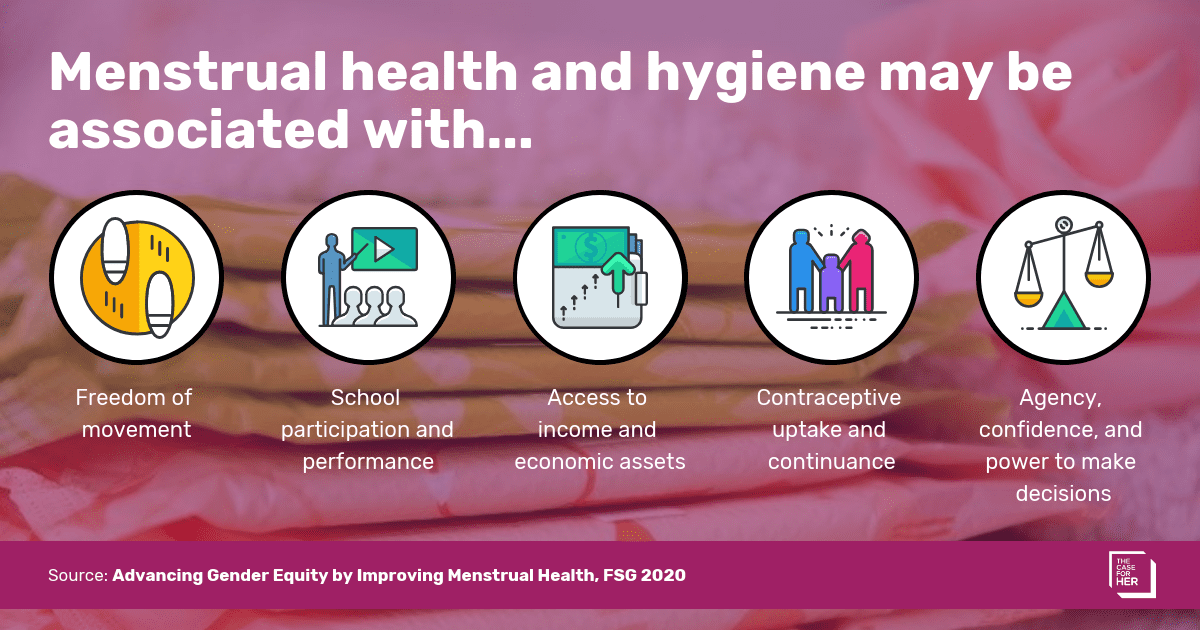Menstrual Hygiene Day this year holds particular significance. The COVID-19 pandemic has exacerbated existing challenges related to menstrual health and hygiene (MHH) and is set to deepen inequities for women and girls around the world. Critical healthcare workers—70% of whom are women—struggle to manage their menstruation due to the difficulty in refitting personal protective equipment, and the limitations to when and where they can shop for menstrual products after long hospital shifts. School closures limit girls’ access to free, government-provided pads and tampons across geographies, and economic hardship leads to households deprioritizing menstrual products in favor of food essentials. Foundations and governments have also diverted existing budgets to fight the spread of COVID-19, exacerbating health and economic gaps for women.
Even without a global pandemic, over 500 million women and girls around the world do not have what they need to manage their menstruation. They lack affordable, high-quality products of their choice, and adequate sanitation facilities that support their needs during menstruation. Yet gaps in MHH go far beyond managing periods. Poor knowledge and awareness of menstrual cycles have a negative impact on the sexual and reproductive health of both women and men. Stigmas and harmful norms related to menstruation perpetuate inequities at the individual, community, and institutional levels. Together, the factors that contribute to poor MHH hinder progress toward gender equity.
Earlier this year, we published Advancing Gender Equity by Improving Menstrual Health, where we highlight key gaps and opportunities in the MHH space. Through our research, we found that improving MHH requires a cross-sector approach that considers the experience of a woman with menstruation throughout her entire life:
- How does her knowledge and awareness of menstruation affect her sexual and reproductive health at different ages?
- How does access to menstrual products of her choice enable her to conduct her daily activities, whether they are succeeding at school or being productive at work?
- How does having access to appropriate sanitation infrastructure help her manage her menstruation in a better way?
- How do social and gender norms influence how she and others perceive her menstruation?
Achieving meaningful progress on MHH also requires having a broader set of actors focus on menstruation in an intentional way. This means agreeing on a unified and cohesive set of metrics through which global datasets can help us track progress and identify where key gaps remain in MHH. More broadly, it means foundations, companies, and governments recognizing that menstruation is not an isolated issue, but rather a critical enabler of gender equity.
Given the disproportionate impacts of the COVID-19 pandemic on women, focusing on menstruation in the pandemic response provides an opportunity to fast-track efforts to improve MHH. Foundations that embed MHH into their current efforts can empower women to thrive in a post-pandemic reality. Companies that provide the right kinds of menstrual products and sanitation facilities can boost the productivity of their female workers. Governments that prioritize MHH funding can safeguard past investments and ensure that gains to increase gender equity are not lost during the pandemic.
Once again, we join our friends at WASH United in celebrating Menstrual Hygiene Day. Over the coming weeks, we will be participating in a series of webinars and online events to share findings from our work and talk about why improving MHH is essential to “building back better” in a way that advances gender equity. We invite you to join us and share why #ItsTimeForAction on MHH.
Thank you The Case for Her for providing the image in this blog.
Learn more about FSG’s gender equity work >

